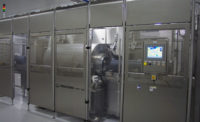Guaranteeing food safety is an essential task for the refrigerated and frozen food industry. ISO 22000 plays a vital role in ensuring quality and transparency, making it worth the effort of compliance for any organization connected to the food and beverage industry, including suppliers.
Introduced in 2005 by the International Organization for Standardization (ISO) as an industry-specific offshoot of ISO 9001, ISO 22000 has quickly emerged as the most important global food and beverage quality standard. That’s why equipment suppliers like Atlas Copco USA, an Acworth, Ga.-based manufacturer of compressors, received ISO 22000 certification for its oil-free air division production facility in Antwerp, Belgium.
But, how far should ISO 22000 certification spread within the cold food and beverage industry?
Benefits of ISO 22000
Compressors are vital for countless applications in the food and beverage production process. Sorting, ejecting and pneumatic actuators are just a few examples of the interactions between compressed air and the refrigerated and frozen food chain, highlighting the importance of manufacturer certification.
For food and beverage processors, the benefits of working with a certified compressor manufacturer are clear:
· Refrigerated and frozen food customers have peace of mind that a key piece of manufacturing equipment was designed and assembled in a controlled, clean and safe environment.
· Increased transparency through a documented food safety management system.
· Contribution to customers’ ISO 22000 certification process.
· A revision of the ISO 22000 standard is currently underway with the update expected in 2017. ISO 22000-certified companies can therefore provide guidance through the updated process.
How ISO 22000 can be required
It is clear that manufacturer certification benefits the industry, making ISO 22000 certification worth the effort of supplier compliance. To achieve the best possible results from the standard, the refrigerated and frozen food industry needs to start pushing for greater manufacturer certification.
Food and beverage processors can introduce supplier ISO 22000 certification as a key requirement in request for proposals and make them part of their ISO 22000 prerequisite programs. This will expand the reach of ISO 22000, integrating it further into all aspects of the food chain.
How to comply with ISO 22000
Even though compressed air is essential in the food and beverage industry, Atlas Copco is said to be the first compressor manufacturer to target ISO 22000 certification. This required an investment from both Atlas Copco and auditing firm Lloyd’s Register Quality Assurance, Houston, Texas, to establish a new type of procedure within the certification process.
The resulting intensive workshops and comprehensively executed audits demonstrated that Atlas Copco’s oil-free facility in Antwerp meets all the ISO 22000 requirements. This means that the site is now certified as having systems in place that consistently provide safe oil-free Z compressors, blowers, dryers, filters and air treatment products for the food and beverage industry.
While the process is time and energy consuming, Atlas Copco’s certification shows that compliance for F&B equipment manufacturers is both feasible and beneficial.






